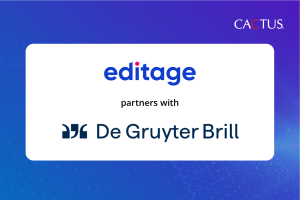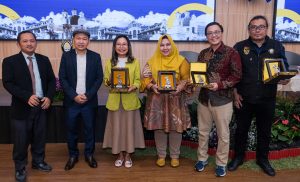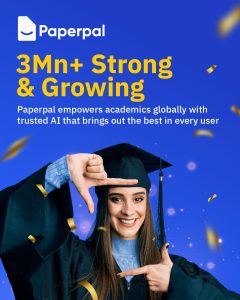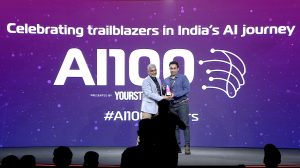The genesis of CACTUS is now part of company lore.
I was in Japan on an internship with AIESEC in 2001 where I happened to meet a researcher at the University of Tokyo to get advice about starting a waste management company.
At the end of our conversation, the researcher asked me to edit his research paper. He wanted to submit his paper to an English-language journal and wanted a native English speaker to “fix” the language.
This got me thinking. There may be other non-native English-speaking researchers around the world with a similar need — skilled subject-matter experts who felt handicapped because the language of international science communication was English.
I pitched the idea to my brother Anurag Goel and he came onboard. And voila! Cactus Communications was born, with Editage as the business brand offering language editing services.
The first step was understanding the landscape. Neither Anurag nor I were familiar with the workings of the research ecosystem.
Japan was familiar territory for me as I had lived there and traveled extensively during my internship, and it became the springboard. Back then, in 2001, Japan ranked 2nd in research funding and research volume, but 4th in the top 10% citations and 5th in the top 1% citations (citations are a measure of scientific impact). High volume but less global impact! It pointed at something that needed fixing.
We launched our first website of four pages in Japanese and English and waited eagerly for inquiries to start pouring in. After all, we were helping solve a big problem — or so we thought.
Days turned into weeks and then months, but we did not receive any inquiry through our website.
We made cold calls, tried to connect to my networks in Japan, and finally, 4 months after we started, the first researcher in Japan sent us an inquiry. And this was a referral.
That business was slow would have been a gross understatement! Six months after we started the company, I visited Japan and met researchers, universities, and academic societies.
When that didn’t show promise, we reached out to English newspapers and magazine publishers in Japan like the Japan Economic Review and Japan Times. We learnt that it would be extremely difficult to get researchers and other customers to work with a new company that didn’t have a track record.
We were in a Catch-22 situation. The only way to grow was through referrals. But how do we get enough referrals to create a positive cycle of referrals?
To sustain ourselves, we started accepting editing work that translation agencies would outsource to us.
We started to believe that we would not be able to build a global brand, and CACTUS would remain small and at best provide back-end support to agencies.
Renewed focus
A year after we started, we had to take a call. Were we going to remain a company that only took on outsourced work?
We decided to give it another push to see if this was something we wanted to devote the best years of our life to.
Around that time, two interns joined us from Japan. One, who had worked with an investment bank, was put in charge of the corporate sector — financial institutions, investment banks, and the like (by now were we exploring all kinds of businesses, including desk research and data analytics). The other, having studied in Japan, had an understanding of Japan’s university structure, and so was put in charge of the segment that we originally wanted to serve.
We started reaching out to university presses in Japan, international outreach departments at universities, any department that could connect us with researchers.
We were operating out of India, and connecting with them via email and phone was proving to be ineffective. Most of the times, we would not be able to connect; if we did manage to reach the right person, they would be not interested.
We wanted to advertise in Japanese newspapers but we needed a Japanese phone and fax number. (Fax machines! Remember those?) We subscribed to a US-based service called eFax, which gave us a Japan-based telephone and fax number. Once we had those numbers, we could start advertising.
There were several operational challenges like these and we were trying to figure them out from the India office.
One-and-a-half years after we started, we didn’t have much traction with researchers in Japan. We had a basic website. We had less than 10 referrals and around the same number of researchers as customers. We were sustaining on the work being sent to us by translation agencies in Japan.
The turning point
One of the mandates we had given the interns was to rework our website to improve the quality of the Japanese content and design it to build better trust.
The intern who was focused on academia in Japan had started revamping the Japanese website. He also studied how search engine optimization works, which was a relatively new concept at the time, and reworked the website content. The intern was extremely vocal about what the Japanese customer would care about and what wouldn’t be important to them. (He’d go on to become the head of our Japan office.)
In November 2004 (18 months after we started), we launched the new website.
Almost immediately, business inquiries from researchers started trickling in.
From that point on, there was no turning back in terms of our customer growth from our websites. Japan went on to be a big success and to date is our biggest market.
Learning along the way
We could have given up at many points along the way. The experience taught us a few things:
- Localization is key. Localization is not just translation into the language of your customer. It is ensuring that the content is written well enough to evoke trust.
- If you don’t see results initially, it doesn’t mean there is no market. Your approach could be wrong. So stick around and experiment.
- People who speak their mind are extremely critical to the initial success of an idea.
- There are no shortcuts. It took two years before we could see an impact. And then, for the next 8 years, we kept asking ourselves, “Is the market big enough?”
We no longer ask ourselves this question.
Over the next few years, we established our presence in other markets, but the process was much smoother. This time around, we knew better!
Reproduced with permission from Abhishek Goel’s Medium account. See here for original article.









